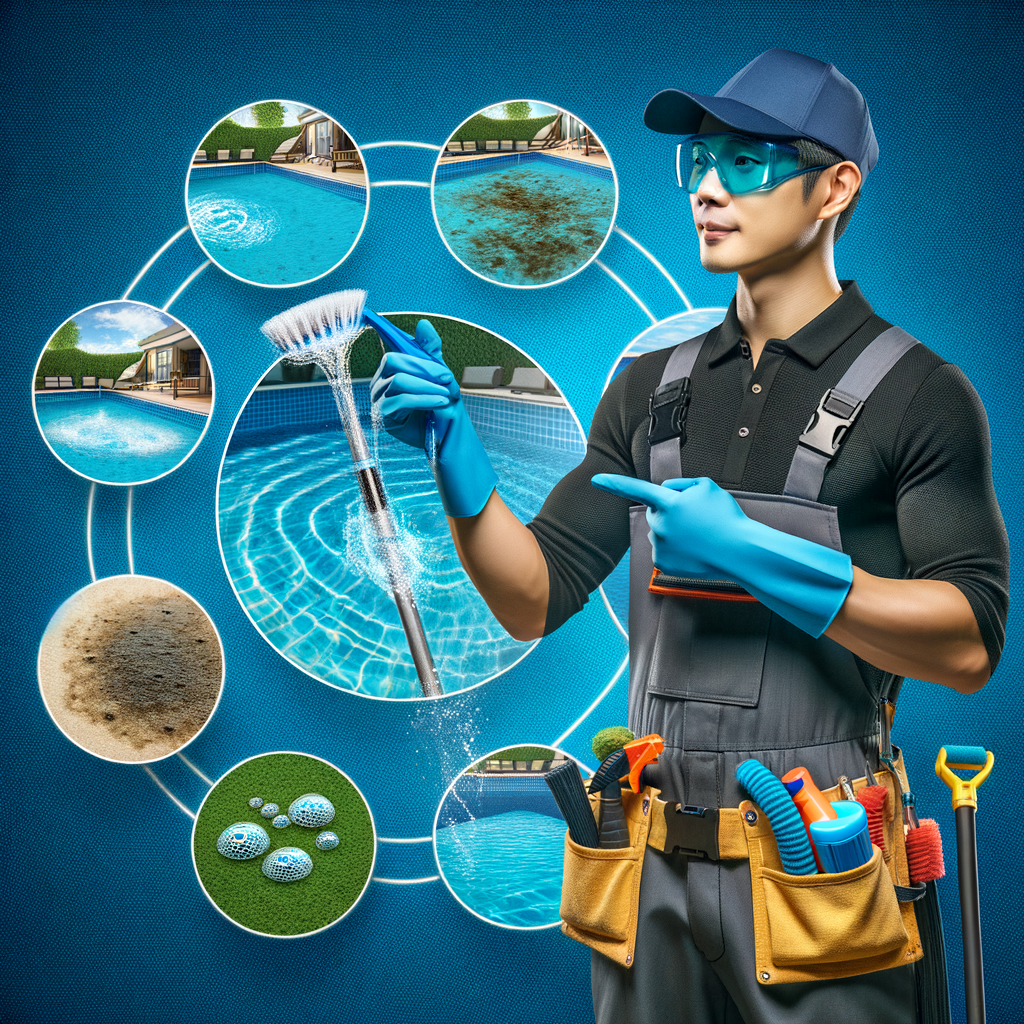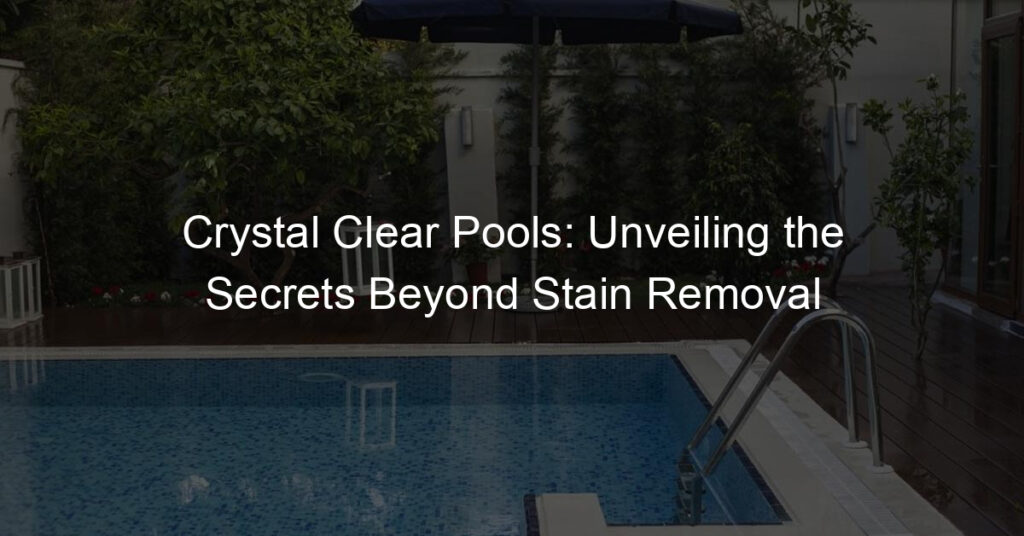
Introduction to Pool Maintenance
Having a pool can be a great source of fun and relaxation, especially during the hot summer months. However, it’s important to remember that owning a pool also comes with certain responsibilities. One of these is pool maintenance. Let’s dive into the importance of regular pool maintenance, the basics of pool care, and the common challenges you might face in maintaining a clean pool.
- The Importance of Regular Pool Maintenance
- Understanding the Basics of Pool Care
- Common Challenges in Maintaining a Clean Pool
Maintaining your pool regularly is crucial for several reasons. First, it ensures the water is clean and safe for swimming. Dirty water can cause skin and eye irritation and can also harbor harmful bacteria. Second, regular maintenance can save you money in the long run. By catching and fixing minor issues early, you can prevent them from becoming major, costly repairs. Finally, a well-maintained pool enhances the overall appearance and value of your home.
Pool care might seem complicated at first, but once you understand the basics, it becomes much easier. The key aspects of pool care include: maintaining the right water chemistry, cleaning the pool regularly, and ensuring the pool equipment is in good working condition. Regular testing of your pool water will help you maintain the correct balance of chemicals. Cleaning involves removing debris, brushing the pool walls, and vacuuming. Regularly checking and maintaining your pool equipment, like the pump and filter, will ensure they are working efficiently.
Despite your best efforts, you might face some challenges in keeping your pool clean. Algae growth is a common issue, especially in warm weather. It can make your pool water look green and murky. Another common challenge is cloudy water, which can be caused by imbalanced chemicals or a malfunctioning filter. Stains on the pool surface are also common and can be caused by metals in the water or by organic material. Understanding these challenges can help you address them effectively and keep your pool sparkling clean.
Remember, a clean pool is a safe and enjoyable pool. So, don’t neglect your pool maintenance. With a little effort and understanding, you can keep your pool in top shape and enjoy it for many years to come.
Pool Maintenance Tips for Crystal Clear Water
One of the most rewarding aspects of pool ownership is seeing crystal clear water that invites you to dive in. However, achieving and maintaining this clarity requires understanding and effort. In this section, we will delve into the concept of pool water clarity and the factors that affect it.
Understanding Pool Water Clarity
Pool water clarity is a term that refers to how clear or transparent your pool water is. It’s an important aspect of pool maintenance that shouldn’t be overlooked. Let’s explore why it matters and what factors can affect it.
- What is pool water clarity and why it matters
- Factors affecting pool water clarity
- Chemical Balance: An imbalance in your pool’s pH, alkalinity, and sanitizer levels can lead to cloudy water.
- Filtration System: If your pool’s filtration system isn’t functioning properly, it can lead to poor water clarity.
- Algae Growth: Algae can cloud your pool water and turn it green. Regular cleaning and proper chemical balance can prevent this.
- Weather Conditions: Heavy rain, high winds, and even high temperatures can affect your pool water clarity.
Pool water clarity is the measure of how easily you can see through your pool water. Clear water is not just aesthetically pleasing, but it’s also a sign of a healthy and safe pool. If your pool water is cloudy or murky, it can be a sign of underlying issues such as imbalanced chemicals, algae growth, or poor filtration, which can be harmful to swimmers.
Several factors can affect your pool water clarity. These include:
Understanding these factors can help you maintain crystal clear pool water. In the next section, we will provide a step-by-step guide on how to achieve clear pool water.
Achieving Clear Pool Water: Step-by-Step Guide
Having a clear and sparkling pool is not a luxury, it’s a necessity. It’s not just about the aesthetics, but also about the health and safety of those who use the pool. Here is a simple step-by-step guide to help you achieve crystal clear pool water.
-
Regular Skimming and Scrubbing
One of the easiest ways to keep your pool clean is by regular skimming and scrubbing. Skimming involves removing debris from the surface of the pool. This should be done daily, or as often as possible. Scrubbing, on the other hand, is about cleaning the sides of the pool to prevent algae build-up. This doesn’t need to be done as often as skimming, but it’s recommended to scrub the pool at least once a week.
-
Proper Chemical Balance
Keeping the right chemical balance in your pool is crucial. It’s not just about keeping the water clear, but also about ensuring it’s safe for people to swim in. The key parameters to check are pH level, alkalinity, and chlorine level. The ideal pH level is between 7.2 and 7.8, alkalinity should be between 80 and 120 parts per million, and chlorine level should be between 1 and 3 parts per million.
Parameter Ideal Level pH 7.2 – 7.8 Alkalinity 80 – 120 ppm Chlorine 1 – 3 ppm -
Regular Filter Cleaning
The pool filter plays a crucial role in keeping your pool clean. It removes dirt, leaves, and even small toys that might have fallen into the pool. Cleaning your filter regularly is essential to ensure it functions properly. It’s recommended to clean the filter at least once a week during peak usage, and once a month during off-peak times.
By following these steps, you can enjoy a clean and clear pool all year round. Remember, pool maintenance is not a one-time task, but a regular commitment. Happy swimming!
Removing Pool Stains: Techniques and Tips
Keeping your pool sparkling clean doesn’t have to be as cumbersome as you might think. All pools are different, and so are their maintenance needs. However, they all share one common trait: The secret to pristine pool health is regular, routine care. One of the key aspects of pool maintenance is dealing with pool stains. Let’s dive into the types of pool stains and how to identify them.
Identifying Different Types of Pool Stains
Pool stains can be a real eyesore. They can appear on the pool’s surface and take away from the overall beauty of your pool. But don’t worry, identifying the type of stain is the first step towards removing it. Here are the most common types of pool stains:
- Organic Stains: These stains are usually green, brown, or yellow. They are caused by organic materials such as leaves, algae, or other plant matter that has fallen into the pool. If you see a stain that’s green or brown and seems to be spreading, it’s likely an organic stain.
- Metal Stains: Metal stains can be a variety of colors, including green, blue, purple, or brown. These stains are caused by metals in the pool water, such as iron, copper, or manganese. If you notice a stain that’s a strange color and doesn’t seem to be spreading like an organic stain, it might be a metal stain.
- Calcium Scale: Calcium scale is a white or grey stain that can appear on the sides of the pool. It’s caused by hard water, or water with high calcium levels. If you notice a white or grey stain that seems to be rough to the touch, it’s likely calcium scale.
Now that we’ve identified the types of pool stains, we can move on to the techniques and tips for removing them. Stay tuned for the next section where we’ll dive into pool stain removal techniques.
Pool Stain Removal Techniques
When it comes to maintaining a sparkling clean pool, removing stains is a crucial task. There are several effective techniques that can help you achieve this. Let’s explore three of the most common methods.
- Using Stain Removal Products
One of the most straightforward ways to remove pool stains is by using specially designed stain removal products. These are chemicals that are specifically formulated to break down and remove different types of stains, such as those caused by algae, leaves, or metals. They are easy to use and often provide quick results.
For example, a product like a stain eraser can be used to scrub away surface stains. These erasers are made of a material that, when rubbed against the stain, helps to lift it off the pool surface. Other products, such as stain removers, are added directly to the pool water. They work by breaking down the stain-causing particles, making them easier to filter out.
- Acid Washing
Acid washing is a more aggressive method of stain removal. It involves draining the pool and applying a mixture of water and muriatic acid to the pool’s surface. This process can remove deep-set stains and can also be used to remove a layer of algae or mineral buildup that can cause discoloration.
However, acid washing is a technique that should be used sparingly, as it can damage the pool’s surface if used too frequently. It’s also important to note that this method requires proper safety measures, including the use of protective clothing and eyewear.
- Pool Shock Treatment
Pool shock treatment is another effective method for removing pool stains. This process involves adding a large amount of chlorine to the pool water to kill algae and bacteria, and to break down organic material that can cause stains.
Typically, a pool should be shocked once a week during the swimming season, and once a month during the off-season. This will help to keep the water clear and free of stains. However, it’s important to follow the manufacturer’s instructions when using pool shock, as using too much can be harmful to swimmers.
In conclusion, maintaining a clean and stain-free pool is a task that requires regular attention and the right techniques. Whether you choose to use stain removal products, acid washing, or pool shock treatment, each method can be effective when used correctly.
Advanced Pool Cleaning Techniques
Keeping your pool sparkling clean doesn’t have to be as cumbersome as you might think. The secret to pristine pool health is regular, routine care. One of the advanced techniques that have gained popularity in recent years is the use of robotic pool cleaners. Let’s delve into this technique.
Using Robotic Pool Cleaners
Robotic pool cleaners are a popular choice among pool owners for their efficiency and ease of use. They are autonomous machines that clean the pool without any human intervention, making pool maintenance a breeze.
- Benefits of Robotic Pool Cleaners
- How to Choose the Right Robotic Pool Cleaner
Robotic pool cleaners offer a host of benefits. They are energy-efficient, reducing your pool’s overall energy consumption. They are also capable of scrubbing all pool surfaces, including the walls and waterline, ensuring a thorough clean. With built-in filters, they can trap even the smallest debris, keeping your pool crystal clear. Moreover, they are easy to use and require minimal maintenance, saving you time and effort.
When choosing a robotic pool cleaner, consider your pool’s size and shape, the type of debris it usually collects, and your budget. Look for features like energy efficiency, easy-to-clean filters, and advanced navigation capabilities. It’s also important to check the warranty and after-sales service. Remember, a good robotic pool cleaner is an investment in your pool’s health and your peace of mind.
Embracing advanced pool cleaning techniques like using robotic pool cleaners can significantly enhance your pool maintenance routine. It not only ensures a clean and healthy pool but also gives you more time to enjoy it. So, make a smart choice and let the technology do the work for you.
Professional Pool Cleaning Services
While maintaining your pool can be a rewarding task, there are times when you might need to consider hiring a professional pool cleaning service. This section will guide you on when to consider professional help and how to choose a reliable service.
- When to consider professional pool cleaning
There are several situations where professional pool cleaning becomes necessary. Here are some of the key scenarios:
- When you lack the time: Pool maintenance can be time-consuming. If you have a busy schedule, it might be best to hire professionals.
- When the pool is heavily used: If your pool is frequently used, it might require more intensive cleaning that professionals can provide.
- When there are persistent issues: If you’ve tried everything but can’t get rid of that stubborn stain or murky water, it’s time to call in the experts.
- Choosing a reliable pool cleaning service
Choosing a reliable pool cleaning service is crucial for maintaining the health and longevity of your pool. Here are some tips to guide you:
- Check their credentials: Ensure the service is licensed and insured. This protects you in case of any mishaps during the cleaning process.
- Ask for references: A reputable company will be happy to provide references. This gives you a chance to hear from other customers about their experiences.
- Consider their experience: A company with many years of experience is likely to provide a higher quality of service.
In conclusion, knowing when to hire professional pool cleaning services and how to choose a reliable one can save you time, effort, and ensure your pool remains in top condition.
Unveiling the Secrets of Crystal Clear Pools
When it comes to maintaining a pool, achieving crystal clear water can seem like a mystery. But with the right strategies, it’s entirely possible. Let’s delve into a case study that illustrates how a public facility managed to maintain a crystal-clear pool.
Case Study: Maintaining a Crystal-Clear Pool in a Public Facility
This case study focuses on a public facility that faced numerous challenges in maintaining a crystal-clear pool. Despite these obstacles, they adopted effective strategies and achieved remarkable results.
- Challenges faced
- Strategies used
- Results achieved
The facility had a high volume of swimmers, leading to increased dirt and debris in the pool. They also struggled with maintaining the right chemical balance due to the constant use of the pool. Additionally, the facility had limited resources for pool maintenance.
To overcome these challenges, the facility implemented a rigorous cleaning schedule, ensuring the pool was cleaned multiple times a day. They also invested in high-quality pool cleaning equipment and chemicals. Regular testing was conducted to maintain the optimal chemical balance in the pool.
As a result of these strategies, the facility was able to maintain a crystal-clear pool despite the high usage. The water quality improved significantly, and the number of complaints about the pool’s cleanliness reduced drastically. The facility has maintained these results for over a year now.
In conclusion, maintaining a crystal-clear pool in a public facility is challenging but achievable. The key lies in regular cleaning, maintaining the right chemical balance, and using high-quality cleaning tools and equipment. By following these strategies, any pool can achieve and maintain crystal clear water.
Key Takeaways for Achieving and Maintaining a Crystal Clear Pool
Keeping a pool sparkling clean doesn’t have to be as tedious as you might think. All pools are different, and so are their maintenance needs. However, they all share one commonality: The secret to pristine pool health is regular, routine care. Here are some key takeaways to help you achieve and maintain a crystal clear pool.
- Regular Maintenance is Key
- Proper Chemical Balance is Crucial
- Invest in Good Cleaning Tools and Equipment
Regular maintenance is the backbone of a clean and healthy pool. This includes skimming the pool’s surface every few days to remove leaves and other debris. It’s also important to clean the strainer baskets at least once a week. If you have trees near your pool, you may need to do this more often. Regular pool vacuuming is also essential. Aim to vacuum your pool every week to keep the water clear and reduce the amount of chemicals you need to add.
Ensuring your pool has the right chemical balance is crucial. This involves regularly testing your pool’s water and adjusting the chemicals as needed. The pH level, which measures how acidic or basic the water is, should be between 7.2 and 7.8. This is the ideal range for pool water because it matches the pH of human eyes and mucous membranes, and it also maximizes the effectiveness of the chlorine in the water.
Investing in good cleaning tools and equipment can make your pool maintenance tasks easier and more effective. This includes a pool skimmer, brush, and vacuum. A pool cover is also a good investment as it can keep debris out of the pool when it’s not in use, reducing the amount of cleaning you need to do.
In conclusion, maintaining a crystal clear pool requires regular maintenance, a proper chemical balance, and the right cleaning tools and equipment. By following these key takeaways, you can enjoy a clean, clear, and healthy pool all year round.














